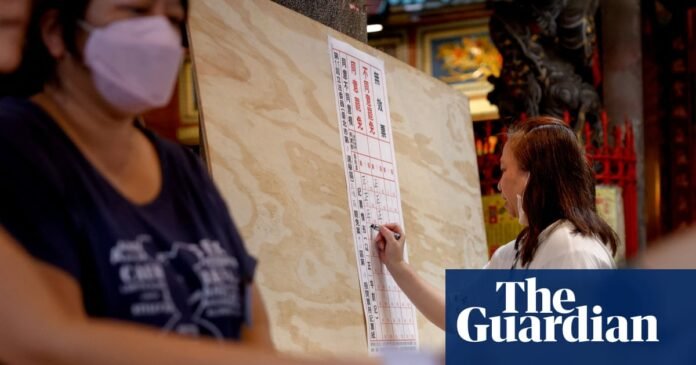An unprecedented attempt in Taiwan to unseat 24 “pro-China” opposition politicians and give a parliamentary majority to the ruling party appears to have failed, with early results indicating voters in every seat had rejected the notion.
Polls opened on Saturday morning for the first 24 of 31 targeted seats, with voters asked to agree or disagree with a proposal to recall the local legislator and hold a byelection.
Polls closed at 4pm local time and within a couple of hours the early results emerged. By 7pm the central election commission said all had failed to pass, reported CNA, the government media outlet.
Under the recall laws, for a seat to be vacated the number of voters in favour must be at least 25% of the electorate and outnumber the votes against.
All 24 seats, as well as seven yet to hold a recall vote, are held by the opposition Kuomintang (KMT), which together with a smaller party has controlled the majority of Taiwan’s parliament since the election last year, when Lai Ching-te won the presidency for the Democratic Progressive party (DPP), a pro-sovereignty party that has vowed to push back against China’s aggression.
The opposition allies used their votes to block DPP bills including defence budgets, freeze court appointments, and propose bills that critics said would weaken Taiwan’s defences. The obstructions sparked mass protests from which the recall movement was born. The KMT are likely to be emboldened by their resounding victory on Saturday.
A flipping of just six KMT seats could free up president Lai Ching-te and the DPP’s agenda, but would also likely see increased hostility from China’s ruling Communist party, which despises Lai and his party as “separatists” for opposing its plan to annex Taiwan. There are a total of 113 seats in the legislature.
Seven seats are still to vote on their recall motions in coming weeks, but Saturday’s losses will put the pressure on the campaigners to get six to vote “agree”.
William Yang, a senior north asia analyst for the International Crisis Group, said the recall campaign had deepened divisions in Taiwan.
“All sides, including all political parties in Taiwan, will need to seriously reflect on the process of this recall campaign and think about how they may be able to find common ground on issues that are key to Taiwan’s security and prosperity,” he said.
Yang said it also raised questions about the DPP using the threat posed by China in election campaigning, “at least at a local level”.
“China may view Saturday’s result as a sign that more Taiwanese people are not in favour of the ‘China threat’ rhetoric promoted by [Lai and the DPP], and this may make them feel like peaceful unification remains a viable option for them to resolve the ultimate ‘Taiwan question’,” Yang said.
“However, this doesn’t also mean that Beijing would dial down the level of military and political pressure that they are imposing on Taiwan.”
The unprecedented vote has fired up the island’s population, just 18 months after a national election. Large rallies were held in Taipei on the eve of the vote, with tens of thousands turning out to support the two sides.
The pro-recall campaign was driven by civil society groups and activists, but since endorsed by the DPP. They had aimed to oust as many as 31 KMT legislators who, they say, are pro-China actors who have risked Taiwan’s national security.
The KMT denies the accusations. They, like the DPP, oppose annexation by the Communist party of China (CCP), but say the best way to protect the status quo is through friendlier ties with Beijing. The party and its supporters have labelled the recall campaign an anti-democratic power-grab by people who won’t accept the results of last year’s election.
Retaliatory campaigns against DPP seats by the KMT all failed, with dozens of officials arrested over allegedly faking signatures.
Senior KMT figures, like party chair Eric Chu, have accused Lai of being a “dictator” who is “more communist than the communists, more fascist than the fascists” – comments that were rejected by Lai and criticised by European and Israeli diplomats.
Beijing has also denounced the recall campaign. The Taiwan affairs office accused Lai of being a dictator and seeking to achieve “one-party dominance”.
Taiwan’s mainland affairs council this week said it was “evident and clear” that the CCP was trying to interfere in Taiwan’s democratic process.






